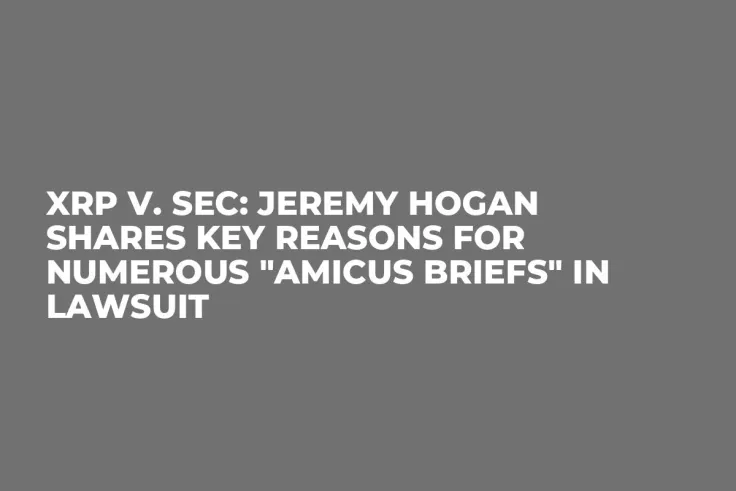
Disclaimer: The opinions expressed by our writers are their own and do not represent the views of U.Today. The financial and market information provided on U.Today is intended for informational purposes only. U.Today is not liable for any financial losses incurred while trading cryptocurrencies. Conduct your own research by contacting financial experts before making any investment decisions. We believe that all content is accurate as of the date of publication, but certain offers mentioned may no longer be available.
Attorney Jeremy Hogan has taken to Twitter to speculate on what might be the reasons for several amicus briefs allowed in the Ripple lawsuit. Hogan defines an amicus brief (AB) as a friend of the court and, historically, they have only been filed in appellate and "top" level courts where particularly complex issues are being resolved.
Why is it important that numerous Amicus Briefs ("AB") have been filed in the Ripple v. SEC case?
— Jeremy Hogan (@attorneyjeremy1) October 30, 2022
An AB is called a "Friend of the Court" and historically, ABs have been filed only in appellate and "top" level courts where difficult issues are being resolved. 1/3
He asked, "That being said, is it normal to see numerous ABs in a trial-level case? Definitely not."
He further added, "The Judge's liberal allowance of amicus briefs in this trial level case would seem to suggest that she understands that the issues involved are complicated, novel and that the ruling will affect a large group of people and/or industry. And I think that's a good thing."
So far, the Chamber of Digital Commerce, Ripple Partner, I-Remit, Tapjets and ICAN are among the major players that have filed amicus briefs in the case.
Over the weekend, SpendTheBits and the Investor Choice Advocates Network ("ICAN") formally filed their amicus briefs in support of Ripple.
This follows after Judge Torres approved requests by major market players, including Philip Goldstein, ICAN and SpendTheBits, to file amicus briefs in the lawsuit. The latest to seek a request to deliver an amicus brief in the lawsuit is The Blockchain Association, which aims to put forward a correct interpretation of the Supreme Court's Howey test in support of Ripple.
Remaining key dates in 2022
Both Ripple and the SEC have filed opening motions and oppositions to the summary judgment briefings. Replies to the summary judgment motions are expected to come in by Nov. 15, by which time all briefings will be completed and Judge Torres's final decision will be awaited.
On or before March 31, 2023, James K. Filan predicts that Judge Torres might decide simultaneously on expert motions and summary judgment. Ripple CEO Brad Garlinghouse is optimistic that the case might see resolution in the first half of 2023.


 Dan Burgin
Dan Burgin Vladislav Sopov
Vladislav Sopov